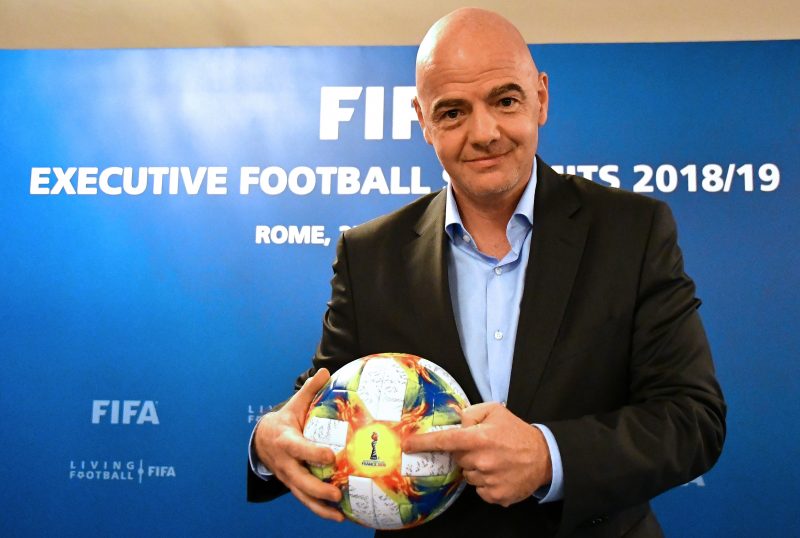World Cup expansion to dominate FIFA agenda in Miami
FIFA president Gianni Infantino hopes to win support for a 48-team 2022 World Cup at a meeting in Miami this week (Alberto PIZZOLI)
Miami (AFP) – The possible expansion of the 2022 World Cup is poised to dominate discussions when FIFA’s ruling council meets in Miami on Friday.
FIFA president Gianni Infantino wants to increase the number of teams due to take part in the footballing showpiece from 32 to 48, bringing forward by four years an expansion which has already been set for the 2026 finals.
Details of an internal feasibility study by FIFA which emerged this week gave broad support to expanding the 2022 finals in Qatar.
But while the study found that the increase would deliver a financial windfall for FIFA of between $300-$400 million, several logistical and political obstacles to expansion remain.
The Qatar World Cup, the first to take place in the Middle East, is due to be held over 28 days in November and December 2022 instead of the usual 32.
Officials have said previously that it is not possible for Qatar to change the number of days of the tournament, meaning games would have to be held in neighbouring states.
If the template of the 2026 World Cup to be staged by the United States, Mexico and Canada is used, approximately 20 of the tournament’s 80 games would need to be held outside Qatar.
But that scenario is complicated by Qatar being at the centre of the worst diplomatic crisis to hit the Gulf in years.
A rancorous diplomatic dispute with former allies, including Saudi Arabia, United Arab Emirates and Bahrain has led to the tiny Gulf state being diplomatically and politically isolated.
A source with knowledge of the feasibility study told AFP this week that five countries were seen as options to stage games outside Qatar in 2022 — Bahrain, Kuwait, Saudi Arabia, Oman and the United Arab Emirates.
But Bahrain, Saudi Arabia and the UAE would only be candidates if their governments ended the Qatar blockade, the study said.
– Regional acrimony –
“Due to the geopolitical situation in the region and the recent blockade that Bahrain, Egypt, Saudi Arabia, the UAE have imposed on Qatar, the involvement of such countries in organising a co-hosted tournament with Qatar would require the lifting of such blockade, in particular the lifting of all restrictions relating to the movement of people and goods between these countries,” the feasibility study said.
“Ideally, this should be evidenced as a precondition to the appointment of such co-hosts and should cover all aspects to the FIFA World Cup Qatar 2022.”
While the bitter regional acrimony would appear to be a significant obstacle to expansion, Infantino has spoken bullishly of a thawing in relations, citing the recent US-North Korea summit in Vietnam.
“The geopolitical situation is complex but I see that Donald Trump and Kim Jong Un met today, so that means that anything is possible,” Infantino said in Rome last month.
“I think it’s worthwhile having a look at the idea and trying (to implement it). Obviously it won’t be easy, but we’ve already made the decision to have 48 teams for 2026, so why not before?” he added.
Meanwhile, FIFA Council members will also vote on the creation of an expanded 24-team Club World Cup, with a “pilot” edition of the new tournament to be held in 2021.
A 17-page report distributed to the 37 members of FIFA’s ruling body calls for the new tournament to take place between June 17 and July 4 2021, replacing the Confederations Cup international tournament.
The new tournament is the result of a working group created by FIFA following opposition to an earlier proposed revamp presented at a meeting last year in Bogota.
The document said five of the six regional confederations were in favour of the proposal being tabled at Friday’s meeting.
However European governing body UEFA, which accuses FIFA of a lack of consultation and transparency over the issue, has opposed the vote citing scheduling problems.
Under the proposal to be discussed, UEFA, which had initially sought 12 teams in the tournament, will have only eight slots.
South America will have six qualified clubs, while Africa, Asia, North and Central America will each have three teams. One team will represent the Oceania region.
Disclaimer: This story is published from a syndicated feed. Siliconeer does not assume any liability for the above story. Validity of the above story is for 7 Days from original date of publishing. Content copyright AFP.


